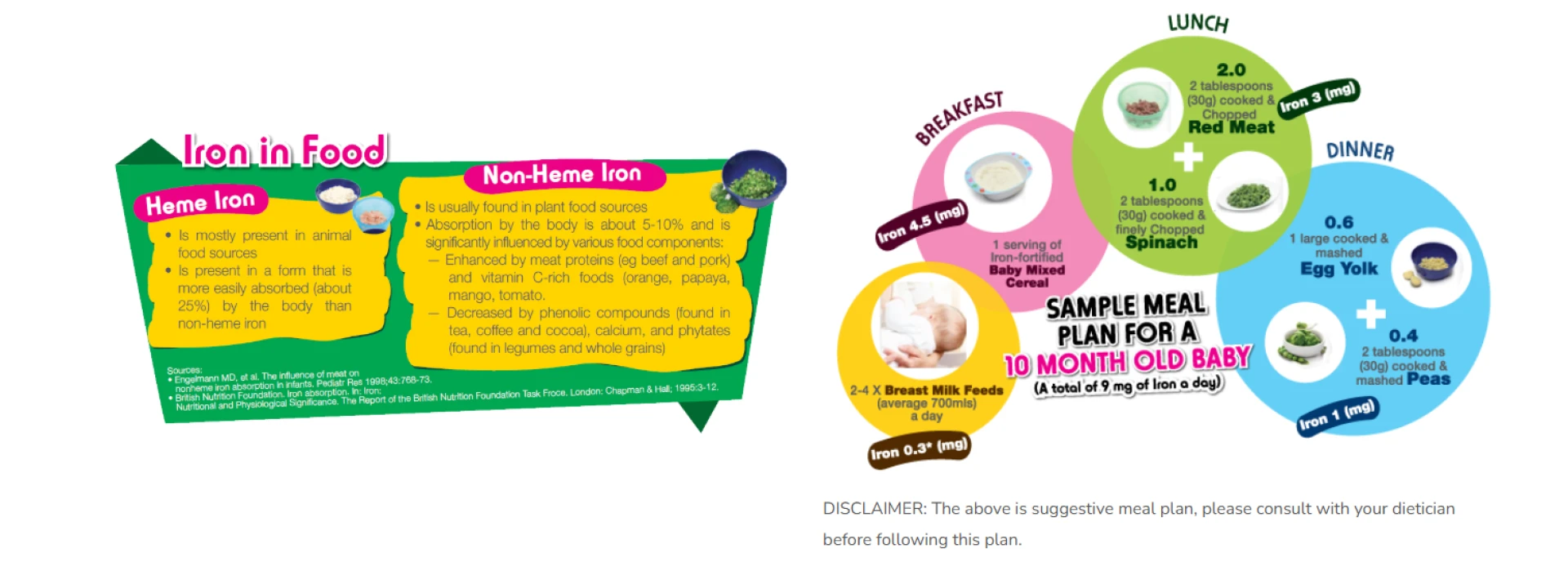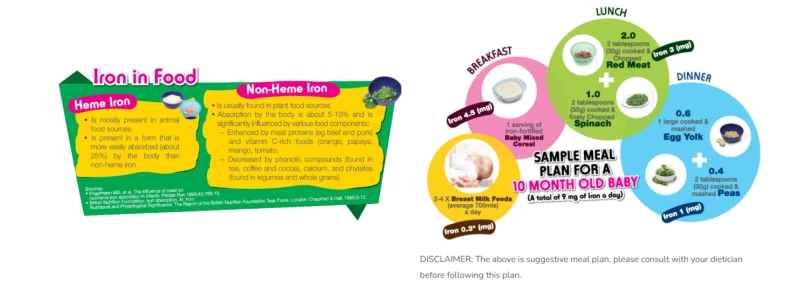Is the baby getting enough of this one mineral that powers their incredible growth? Wondering about the best iron rich foods for babies? The answer could be in their next meal. Iron is an indispensable element in the baby's growth and development. It is the key part used in producing hemoglobin, the protein in red blood cells that transports oxygen throughout the body.
Normally, babies especially those of up to 24 months require partner ore to ensure a stable supply of iron for their fast growth. In this blog, we will discuss the best iron-rich foods for babies, how to include them in meals, and ideas for your baby to get the iron they need.

Why Is Iron Important for Babies?
Babies are born with iron stores from their mother’s blood, but these stores start depleting around 4 to 6 months. Iron deficiency anemia is a condition that could be expressed through tiredness, paleness, and underperformance in baby development. Prevention of this type of anemia through the delivery of iron to the babies' diet is imperative.
Types of Iron in Foods
1. Heme Iron
The type of iron found in animal-based foods is more easily absorbed by the body.
2. Non-heme Iron
The iron that is in plant-based foods, on the other hand, is not as easily absorbed, but this can be increased by consuming foods that are high in vitamin C.
8 Best Iron-Rich Foods for Babies
1. Meat and Poultry
Rich in heme iron, these foods are excellent for meeting your baby’s iron needs:
- Beef: Beef shreds like minced beef or cooked thin strips of beef are good choices.
- Chicken: Serve either finely shredded or minced chicken to a child in the feeding process.
- Turkey: Lean turkey is another high-iron choice.
2. Iron-Fortified Cereals
Iron-fortified cereals are easy to find and a surefire way to get iron. They are particularly suitable for babies who change their feeding habits from liquid to solid foods.
- They might as well take rice, lactates, or barley as cereals.
- Add breast milk, formula, or water to get a perfect consistency.
3. Seafood
Some fish and shellfish are good for obtaining heme iron:
- Salmon: Packed with iron and omega-3 fatty acids.
- Sardines: A soft, easy-to-mash food for babies.
Tips: To avoid the mercury content in fish, for instance, you can also cut off or reduce swordfish or king mackerel.
4. Legumes
For plant-based options, legumes are the most suitable foods:
- Lentils: Cook lentils and eat them mashed for easy digestion.
- Chickpeas: You can mash boiled chickpeas or make hummus with the help of a blender.
- Black Beans: Use them as part of puree or mix with the remaining dish.
Legumes are best to be taken with vitamin C, so mix them with fresh tomatoes or citrus fruits to foster iron absorption
5. Green Vegetables
Leafy vegetables and other foods have what is known as a non-heme iron that is available for us:
- Spinach: Cook and puree or finely chop for older babies.
- Broccoli: Steam until soft and offer as finger food.
- Peas: Mash or serve whole for babies practicing pincer grasp.
6. Eggs
The yolks of the eggs are particularly rich in iron:
- Use a soft-boiled, mashed version for youngest babies; or scrambled eggs can be used.
- Small pieces of hard-boiled eggs can be also good to be given to older infants.
7. Tofu
Tofu is a binder in multiple.
- Cut into small cubes and make it a finger food.
- Mash or blend into soups and purees.
8. Iron-Fortified
Formula-fortified formulas, made for babies that are formula-fed, require the necessary nutrients. When getting the formula, see your pediatrician, as he/she will let you know if it is what your baby is in need of.
Improving Iron Absorption
Feeding your baby with as much iron as possible with a combination of iron-containing foods with vitamin C sources, such as:
- Citrus fruits: Oranges, lemons, and grapefruits.
- Strawberries: Serve fresh or mashed.
- Bell peppers: Steam and chop for easy handling.
Element of iron with highly active calcium-containing food such as milk or cheese in the same meal can bring about iron absorption being stopped by the calcium.
3 Signs of Iron Deficiency in Babies
The following are the signs that might signal a low level of iron in the blood:
- Pale skin or gums.
- Low energy or fatigue.
- Slow weight gain or developmental delays.
In case you have observed the above-mentioned symptoms, see a pediatrician for a blood test and advice.
Final Tips for Parents
- Start with simple foods: Always check for allergies when you give new foods to babies, especially proteins such as eggs and seafood.
- Be consistent: Have foods with iron in every meal to meet your baby's daily requirements.
- Keep portion sizes under control: Give small portions and let your baby decide how much they want to eat, to avoid overeating or the risk of choking.
In short, the most important thing for the complete health and success of your baby is their getting enough iron. Lack of iron can be very dangerous, affecting the development of the brain and mental and physical well-being as well. To avoid this, add various iron-rich foods into their diet. Which include lean meats, poultry, fish, legumes such as lentils and beans, cereals fortified with iron, and leafy vegetables like spinach and kale.
Consider that first and foremost the best iron foods for babies is that, besides being so, is easy to digest and consumed as is. Additionally, the iron content of the diet can be boosted by the inclusion of iron-containing sources with vitamin C sources like various citrus, strawberries, and green/red/yellow or orange bell peppers. Strategic menu planning in addition to regular control is mandatory. Interpret this precaution as iron is the missing element in your baby's health or you are concerned about it being low. It is the clever choice that will provide a loyal and nature-selected start for a healthy and strong first period of life for your safe school children.


